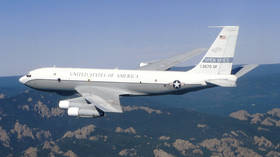NATO says 'intimidating' Russia BIGGEST threat to bloc till at least 2030 – plans to send warships to Black Sea
A bombshell report by NATO has accused Russia of threatening Western interests from the Atlantic Ocean to the Arctic, as the bloc's secretary general calls for members to escalate their presence on the country's borders.
The analysis, published on Wednesday, argued that Moscow engages in "assertive policies and aggressive action," which has "negatively impacted the security of the Euro-Atlantic area." "In the long term until 2030, Russia is likely to remain the main military threat to the North Atlantic Alliance," the authors of the report say.
It added that Moscow frequently orders "intimidatory military operations in the immediate vicinity of NATO." The comments come just two days after the head of the organization, Jens Stoltenberg, told a press conference that members need to further strengthen their presence on Russia's borders on the Crimean peninsula and the Black Sea, and spoke of a need to increase their naval presence in the region.
Also on rt.com American missiles capable of striking Crimea fired into Black Sea as risk of confrontation on Russia’s borders continues to growAs part of rising tensions, last week the US conducted a series of rocket-launch tests during NATO exercises in Romania, firing long-range missiles with the capability to hit Russian territory into the Black Sea. Responding to the drill, the deputy head of the Public Chamber of Crimea, Alexander Formanchuk, told reporters that Russian armed forces had deployed advanced hardware on the peninsula, which would neutralize any "surprise missile attack."
The politician argued that the exercises fit within a wider pattern of escalation, saying that "provocations against Crimea have become more frequent. Unfortunately, we are witnessing a further exacerbation of international relations and the international situation. And the topic of Crimea is a convenient reason for escalating such provocations."
Earlier this month, the Russian Navy threatened to ram an American warship, the USS 'John S. McCain', which it says was intercepted two kilometers inside Russian waters in the Sea of Japan, off the coast of the Far East capital of Vladivostock.
In his address to leaders on Tuesday, Stoltenberg added that "we see Russia violating and undermining treaties." Moscow has, however, expressed similar concerns after the US unilaterally scrapped a number of international agreements, including the Cold War-era Open Skies pact that allowed for transparency over the movements of troops and military hardware on the continent.
Last year, President Donald Trump's White House also tore up the Reagan-era Intermediate-Range Nuclear Forces Treaty that had banned a number of highly destructive weapons with ranges of between 500km and 5,500km. At the time, Washington also accused Russia of breaking the conditions of the pact, while Moscow strongly denied the allegations.
Like this story? Share it with a friend!















